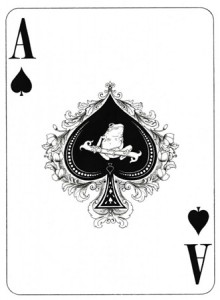40 years at one job is not commitment, its devaluing yourself
-Diversification: the key to investing successfully, so if one section tanks the others will keep you afloat. Apply the same philosophy to your work and lifestyle.
Sample: 100 people at the age of 60. Of this test group 61 people were what I call “Aces”,  they stayed in for the long haul. May not have worked in the exact same company for their professional lives, but were extremely tracked in their work environment. They played the game with their best card and nothing else. The other 39 people were what I labeled as, “Wild Cards”.
they stayed in for the long haul. May not have worked in the exact same company for their professional lives, but were extremely tracked in their work environment. They played the game with their best card and nothing else. The other 39 people were what I labeled as, “Wild Cards”. They transitioned through life always having a “best card”, which they focused on at any particular time. But, that card was changing and evolving along the way. They were adding value to experiences and diversifying their portfolio. That last sentence is probably marketed more by investment firms than any other phrase. If you don’t believe me, go to any financial advisor, read any article about successful investing techniques. If the word diversification is not in there you either need another FA or you need to stop reading that publication. This is a simple concept that is highly weighed upon when investing monetarily.
They transitioned through life always having a “best card”, which they focused on at any particular time. But, that card was changing and evolving along the way. They were adding value to experiences and diversifying their portfolio. That last sentence is probably marketed more by investment firms than any other phrase. If you don’t believe me, go to any financial advisor, read any article about successful investing techniques. If the word diversification is not in there you either need another FA or you need to stop reading that publication. This is a simple concept that is highly weighed upon when investing monetarily.
Would you dump every single penny you own into one stock or one fund? A resounding no should be your answer. What would happen if it tanked? You would lose everything you have. Splitting your money into multiple assets doesn’t only allow for a higher success rate, but also helps alleviate the pressure for one singular section to improve. Sounds like a very intelligent approach to safeguarding your money and your future. So, why not try to apply the same methodology to yourself, your education, and your experiences. Here is my one and only rebuttal, if you are highly specific and regarded in your possession for knowledge then tracking yourself can be the intelligent choice. Are you a neuroscientist, then you might not have to read this. But for the rest of us, expanding your portfolio only strengthens yourself. When I find a theory, individual or book I am intrigued with, after reading I find the complete polar opposite to that view. Whether it is someone that disagrees with what is being presented or a theory that counteracts the point. I immediately place as much weight as I can on something that interests me. Why?
So, why not try to apply the same methodology to yourself, your education, and your experiences. Here is my one and only rebuttal, if you are highly specific and regarded in your possession for knowledge then tracking yourself can be the intelligent choice. Are you a neuroscientist, then you might not have to read this. But for the rest of us, expanding your portfolio only strengthens yourself. When I find a theory, individual or book I am intrigued with, after reading I find the complete polar opposite to that view. Whether it is someone that disagrees with what is being presented or a theory that counteracts the point. I immediately place as much weight as I can on something that interests me. Why?
This ties in the idea of diversity, whether it is taking multiple perspectives on the same topic or just prospecting multiple topics it is a healthy outlook. Counterbalancing the scale will either do 1 of 3 things.
- Completely destroy the foundation – which if the polar view is that strong and convincing, they just did you a favor. Time wasted in debunked theories is a costly mistake. Doing immediate research in the exact opposite side of the spectrum saves the time vested in diving deeper into something that should not have been stumbled upon in the first place.
- Reinforce the foundation – seeing the unfiltered and untainted views and arguments against something can increase your belief in it as well. Here you can find reinforcements to whether your interests hold any ground.
- Balance the scale – If a resounding conclusion is not found, the counter-perspective may just be that. An equidistant counter of information. Though not as dramatic in effect, it is still very useful. Keeping your beliefs afloat allows for constructive criticism to plays its part and evolve your understanding.
Bringing it back to my “Aces” and “Wild Cards”, what does this mean? The individuals that saw themselves as having only one value and one strong hand, never pursued the other side of the coin. While the individuals that gave them selves room for multiple good hands had questioned and viewed their actions from a conceptual perspective rather than just another cog in the machine. These findings played an interesting role on peoples’ perception on their lives, regrets and emotions. Read on further to discover these findings.
One interesting case studies on the individuals polled was a gentleman that only 3 years back was working as a floor manager within a large scale casino. He was not unhappy with his life, but saw a projection of years to come with a very stagnant image of him portrayed throughout. Taking time to look at the branches that reach out from his job, he pondered what more could be done for himself. His wife at the time worked for a non-profit organization raising money for locals school creative arts programs. With a list as long as Hugh Heffner’s ex-girlfriends, raising money for this particular cause was no easy feat. After taking time to process and filter through many ideas, one rose to the top. Read into Finding your Muse: Preparations for Creativity, to see how brilliant ideas come about. What this gentleman realized is throughout his tenure many machines at the casino would be replaced, have minimal defects or just be removed. So he wrote out a short and simple proposal to the higher ups in the company propositioning the idea of him taking or purchasing these old and defective machines to be used for charity fund-raising events.
Even the executives made sure to see the other side of this action, which takes it to a whole other level. They were quite thrilled by this proposition. All the machines that could not be sold off, were given to him on the stipulation this casino was publicized for donating them for charitable reasons. It is fairly obvious at this point that he was able to raise a considerable more amount of money for his wife. That alone is a very rewarding conclusion to viewing yourself and your environment as a whole, instead of just another piece in the puzzle. What the casino executives could not have predicted was the marketing they provided to these machines and the profitable casino nights they produced. Within a few weeks time these once replaced machines were now booked up months in advance for rental. The business became so overwhelming he took a leap, invested into more machines and went at it full time. He now has a company formed that rents casino equipment for events and movie productions. He has most recently worked with Jason Statham and Ray Liotta. Supposedly there set exploded machines that were supposed to be returned, and he got paid full value plus rental costs. Would you rather be an “Ace” or a “Wild Card”?
A great way to start the creative process when looking to transform things is to try what I call the “negative” experiment. You must be able to take criticism with this, and you must choose people that will formulate viable opinions. There are four sides to the process, Management, Employee, Customer and Public. Within each one of those fields ask someone what they perceive as the negative side to your industry, company, and job. Ask them what could improve, whether it is profits, image or experience. Compare the answers and you will be surprised by the outcomes. There will be some similarity throughout which should be immediately addressed as it has an effect across the board. But, most interestingly will be the answers more than likely from the employee and the public. Certain independent answers if properly addressed can have long lasting residual effects. If you can improve the employees morale, that will help retain people that already have an interest, i.e. customers. As well, if you can provide and attract the public who had no interests before, those changes will only reinforce the existing customers in the middle.
Back to the 100 people polled. We have seen so far that 61 people labeled themselves as having an easily tracked progression throughout their lives. Where the other 39 people labeled themselves as conceptual types, creating multiple parallel paths along with the main line. Testing other avenues is exactly like diversifying your portfolio. Failure is only a masked version of success. I love recording and filing all my failures or success’ ugly cousin in a manageable and reviewable way. What was of great note to me about the 100 people polled was the striking disparity in ones regrets and missed opportunities. Of the 39 “Wild Cards”, not one could definitively label a regret or missed opportunity. Sure there was always Jennie Swanson back in the 6th grade or your crazy friends scheme to build an underground society. But not one route that noticeably was not walked down or pursued. On the opposite side of the spectrum of those 61 “Aces” a resounding 41 of them could cite specific times in their life where they wish they made a “rash” decision or took more risk. There are many other outside factors affecting this representation, but 0% versus 67% does say a lot. In the overall scheme of our existence which hurts more, Regrets or Failures?
I know my choice, my filing system grows by the day.
Leave a Reply